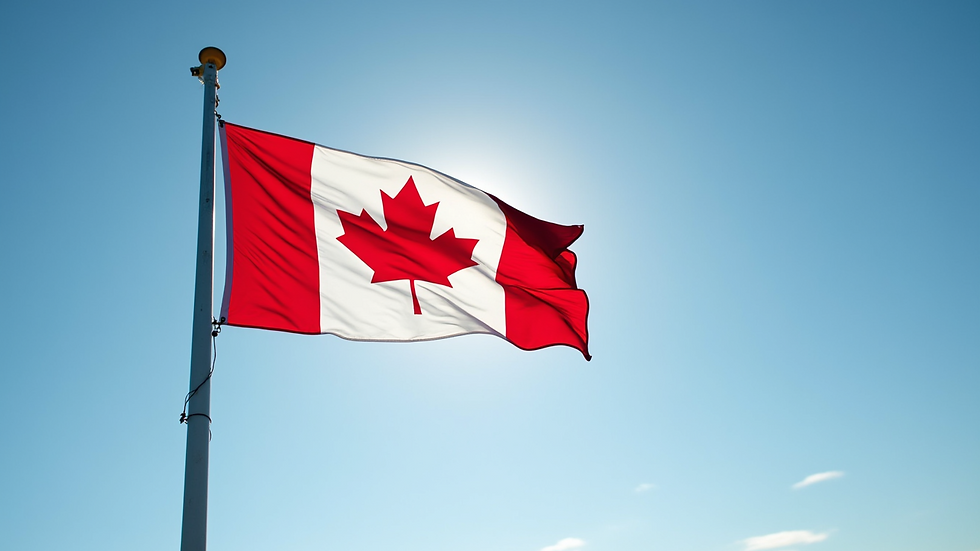Understanding the Shifts in Canada's Political Landscape Today
- May 1
- 3 min read
In Canada, political conversations frequently lean towards the left, leaving a significant right-wing voice underrepresented. The conservative perspective can act as a critical counterbalance to mainstream views. This blog post explores Canada's political landscape through a right-wing lens, highlighting policies, values, and future governance possibilities in the Great White North.
Understanding Right-Wing Values in Canada
Right-wing ideology in Canada centers on principles like personal freedom, fiscal accountability, national security, and a preference for limited government interference. Conservatives prioritize individual responsibility, free markets, and traditional values, differentiating themselves from more progressive approaches.
For example, in 2021, a survey showed that 38% of Canadians identified with or leaned towards conservative ideologies, highlighting a substantial portion of the population that values these principles. Understanding these perspectives enhances our national dialogue, offering essential insights into the ongoing debate about governance and policy.
Economic Policies: A Conservative Approach
A core pillar of right-wing politics is its economic philosophy. Conservatives advocate for lower taxes and reduced government spending, believing that a thriving market environment benefits all Canadians by creating jobs and fostering innovation.
During the tenure of the Conservative Party from 2006 to 2015, Canada saw the corporate tax rate reduced from 21% to 15%. This significant cut was aimed at attracting investment and stimulating economic growth. Critics of increased government expenditure, like those seen during the pandemic, often argue that unchecked spending can lead to far-reaching deficits and economic instability, which hurt long-term financial health.

By emphasizing fiscal conservatism, the right advocates for balanced budgets to ensure sustainable economic growth, arguing that fiscal discipline is essential for a prosperous future.
National Security: A Pillar of Right-Wing Politics
National security is a defining issue in right-wing political dialogue. Conservatives typically advocate for increased defense spending and a strong military presence, believing these elements are vital for safeguarding Canadian sovereignty and international interests.
Issues such as crime, immigration, and border security remain central to right-wing agendas. For instance, right-wing proponents often campaign for stricter immigration policies aimed at prioritizing skilled labor. In fact, a 2020 poll indicated that 63% of Canadians support stricter immigration controls, reflecting public concern over the impacts of immigration on resources and national identity.
By emphasizing law and order, conservatives argue that a safe society is a prerequisite for personal freedom and economic success. These sentiments resonate with many Canadians who are increasingly apprehensive about safety and immigration regulations.

Cultural Conservatism: Upholding Traditional Values
Cultural conservatism is central to the right-wing agenda, focusing on preserving traditional values and societal structures. The right advocates for policies that promote family, faith, and community, viewing these elements as the backbone of a stable society.
In contrast to progressive views that may encourage rapid social change, conservatives often argue that rapid shifts can harm societal cohesion. By emphasizing family units and community involvement, the right seeks to build unity and mutual support among Canadians.
For example, recent discussions about educational curricula reflect this desire for stability, with many conservatives advocating for family-oriented education that supports traditional values.
The Future of Conservative Politics in Canada
As Canada moves forward in a complex political environment, the future of conservative politics holds both promise and obstacles. The growing demand for change suggests that right-wing values could resonate with grassroots movements.
However, opposition parties must communicate their ideas effectively to connect with Canadians who may lean progressive. Issues like climate change and social justice present challenges that require conservative leaders to find a balance between environmental responsibility and economic opportunity.
Engaging with the public, fostering transparency, and encouraging dialogue are crucial for right-wing advocates. A strategy that includes building coalitions and grassroots mobilization may help increase the appeal of conservative values to a broader audience.
Embracing Diverse Perspectives
Exploring Canada’s political landscape through a right-wing lens reveals the importance of acknowledging varying perspectives in governance. Conservative values—rooted in personal freedom, fiscal responsibility, and traditional integrity—contribute to a richer political dialogue affecting all Canadians.
Fostering understanding of right-wing viewpoints is vital for meaningful political engagement. An inclusive discourse that respects diverse ideologies promotes harmony and strengthens our democracy. By recognizing the role of conservative principles, Canadians can pave the way to unite various political identities, striving for a more productive and prosperous society. A thoughtful examination of all viewpoints is essential for a healthy democratic process, ensuring everyone has a voice in shaping the future.












Comments